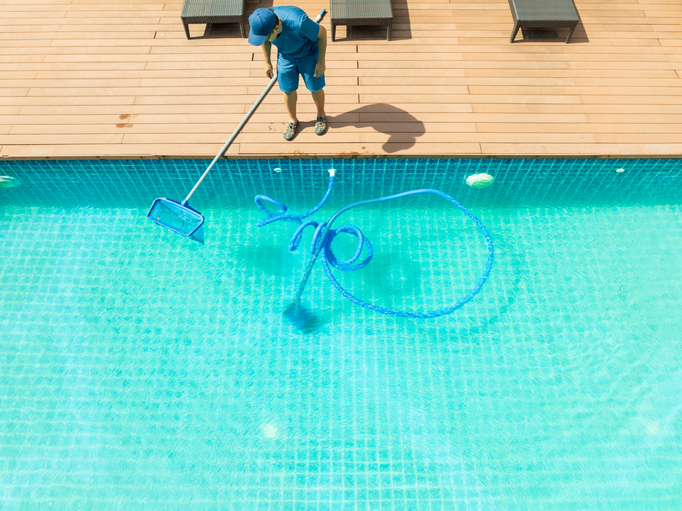Welcome to Pool Ownership: A Dive into Maintenance
Taking the plunge into pool ownership can be both thrilling and rewarding. Imagine transforming your backyard into a personal retreat – a hub for relaxation, entertainment, and cherished family moments. However, this newfound luxury comes with the essential responsibility of maintaining your pool. At PoolRepair.fyi, we emphasize that understanding the fundamentals of pool maintenance—from chemical balancing to equipment management—will make these tasks an integral and easy part of your routine. Dive in as we explore key maintenance insights to help you navigate the joys and duties of owning your first pool.
Grasping Circulation, Filtration, and Sanitization
Having a firm grip on your pool’s circulation, filtration, and sanitization processes is crucial for all pool owners. These components work together to create a balanced, healthy pool environment, thereby simplifying ongoing maintenance and extending the life of your pool equipment. Understanding these elements is your first step toward effective pool management.
Superior Circulation
Effective circulation is vital, ensuring your pool water moves uniformly to distribute chemicals and prevent stagnant areas where algae and bacteria could multiply. This movement directs debris toward the skimmers and filter, enhancing system efficiency and keeping water clear and inviting. The pump, often called the heart of the system, pulls water for filtration and returns the clean water to the pool daily.
To maintain peak circulation, ensure the pump and skimmer baskets are clean and correctly positioned, and the pump lid is secure to prevent air leaks. Run your pump for at least 8–12 hours daily, adjusting as necessary based on conditions. Regular checks for unusual sounds or pressure changes can help you catch potential issues early.
Optimal Filtration
Filtration plays a crucial role in maintaining clear pool water by capturing fine debris. Consistent and thorough cleaning is necessary to prevent cloudy water, using the pressure gauge to identify when to clean or backwash your filter. Each type of filter, whether sand, DE, or cartridge, has specific maintenance needs that you should familiarize yourself with.
Annual deep cleaning using specialized filter cleaning solutions can improve performance by removing built-up oils, scales, and dirt. The frequency and method of cleaning will depend on your filter type — be it sand, DE, or cartridge — and the manufacturer’s guidelines.
Effective Sanitization
Sanitization is the final step to safeguarding swimmers by eliminating harmful microorganisms. Most pool owners prefer chlorine tablets for their convenience and cost-effectiveness, maintaining levels between 1–4 ppm. In addition to regular chlorine levels, weekly shock treatments help address invisible germs and algae. Use cyanuric acid to protect chlorine from sunlight degradation, maintaining the stabilizer levels between 30–50 ppm for effective results.
Mastering Pool Water Chemistry
Understanding pool water chemistry is key for first-time owners. A comprehensive test kit, such as those from Taylor, provides accurate readings needed to maintain balanced water. Routine testing should be part of your maintenance ritual, with local pool stores offering assistance if needed. The ideal chemical levels are critical: pH between 7.4–7.6, alkalinity at 80–120 ppm, calcium hardness at 200–400 ppm, and stabilizer (cyanuric acid) at 30–50 ppm. Regularly performing Langelier Saturation Index calculations can prevent scaling and ensure water balance.
Chlorine and Shock Maintenance
Regular addition of chlorine—typically weekly—keeps your pool sanitized. Using 3″ chlorine tablets ensures a consistent chlorine level that combats bacteria and algae. Shocking, on the other hand, is crucial for addressing build-ups like algae or chloramines. Weekly shocking, or following heavy use or weather events, helps maintain clear and safe water. Chlorine-free shock options can speed up recovery times post-treatment, allowing for nearly immediate pool use.
Essential Pool Chemicals
Stock up on key chemicals, including chlorine tablets and shock, regardless of your pool system type. Balancing chemicals like pH increasers/reducers, alkalinity boosters, and cyanuric acid stabilizers should be readily available. Additional treatments, such as clarifiers or algaecides, can optimize your pool’s condition when needed.
Familiarizing with Pool Equipment
Your pool’s equipment, especially the pump, is integral in maintaining water movement and cleanliness. Regular monitoring of the filter pressure gauge will alert you to maintenance needs, ensuring your filter captures debris efficiently. If equipped with a heater, remember its role in warming over time and its position in the circulation system, just before chlorination equipment.
Automated cleaning systems can substantially ease maintenance tasks, though they require periodic part replacements and debris disposal. Recognizing the interplay of these systems will allow for more seamless maintenance and prompt issue detection.
Executing Routine Maintenance Tasks
Consistent maintenance practices are essential for ensuring your pool remains a beautiful and healthy feature of your home. Here’s a guide to daily, weekly, monthly, and seasonal tasks to keep your pool in prime condition.
Daily Responsibilities
Each day, assess your pool’s water clarity, color, and movement. Regularly check the pump flow, listen for unusual sounds, and ensure proper filter pressure for optimal water flow.
Weekly Maintenance
On a weekly basis, remove debris, scrub surfaces, and vacuum as needed to maintain cleanliness. Balance water chemistry and replenish chlorine levels, conducting a shock treatment to eliminate impurities and maintain water safety.
Monthly Focus
Monthly tasks include cleaning dive and slide surfaces and lubricating all O-rings to prevent leaks. Attention to these areas maintains operational efficiency and extends equipment lifespan.
Seasonal Responsibilities
Seasonal upkeep involves performing deep filter cleans with appropriate solutions, checking automatic cleaner components, and preparing for winter in colder climates. Each task prepares your pool for optimal performance throughout the year.
Pool ownership is a commitment that blends enjoyment with responsibility. Understanding and managing your pool’s various aspects will ensure a balanced and inviting aquatic retreat. Explore more tips and insights on pool care in our wide array of articles at PoolRepair.fyi for continual guidance on maintaining the perfect pool.
#PoolRepair #PoolMaintenance #PoolOwnersGuide #SwimReady #UnderwaterUpkeep


